Every business decision, every operation, every step must be based on something tangible. That something is data, which is becoming the new fuel for many companies. However, these data must be managed correctly. This is what has been addressed on the third day of the Cycle of Meetings on Digitization and Technology organized by La Vanguardia and Pimec that has been carried out in the auditorium of the Torre Glòries in Barcelona.
The digitization of operations and organizational functions, from sales to marketing to pricing platforms, means that many businesses, especially small and medium-sized ones, feel overwhelmed with what to do with the vast amounts of data they handle.
Data is a company asset and should help increase profits. That is why in the current digital environment it is essential to have good control and know how to manage, compile, categorize and interpret information so that it can add value to customers and position itself competitively with respect to the competition.
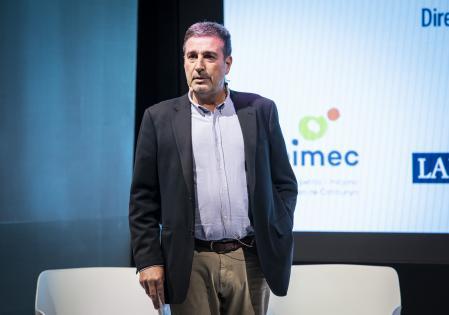
Bru, in the absence of Jordi Marín (general director of ACEC) acted as moderator in the round table
Llibert Teixidó / Propias
However, not having the necessary tools to be able to carry out good data management can mean making bad decisions, data loss or quality problems, among many other setbacks. A single incident in data management can have a very negative impact on the company. In addition, with a high economic cost that, probably, cannot be faced. Although it may not seem like it, this is not the biggest problem, but the ignorance of these consequences until the very moment they occur and it is already too late.
In the event, sponsored by Banc Sabadell and Telefónica and moderated by Andreu Bru, Director of Technology and Innovation of the Employers’ Association PIMEC, it has become clear that SMEs are obliged to be proactive and take advantage of the opportunities offered by the current scenario.
Cycle of Meetings on Digitization and Technology
Change of concept: Fast Data
Genís Roca, president of the Fundació Punt.cat, has reflected on the trend of Big Data, which many companies have joined despite not being too familiar with this science. The name of the concept already indicates that a large amount of data is handled, for this reason there may be complications for companies. In this sense, Roca has pointed out that it would be appropriate to refer to “Fast Data” because “sometimes it is more important to have two or three important data to make decisions based on data”. It is having data and using it quickly to get results.
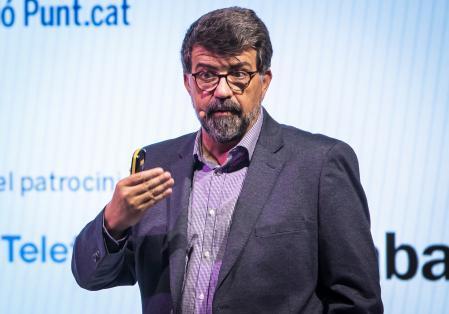
Roca has delved into the value of data within companies
Llibert Teixidó / Propias
The trick to doing projects with data, according to the expert, is to have the right questions. Only with precise questions can “have the right data to generate value”. But we must bear in mind that “data is the oil of the new economies” understanding that they are “a highly toxic, flammable and polluting material”. They are very useful, yes; but you have to know how to manage them. This will be key so that there is trust on the part of the clients. “Without trust they will not give us the data,” Roca acknowledged.
Cycle of Meetings on Digitization and Technology
Compete on equal terms
Karina Gibert, director of the IDEAI Research Center – UPC, has assessed the dangers of transferring data to which companies and how it is done. Gibert has stated that many people do not know what data they are giving, so a breeding ground of distrust is created – what will be done with our data? who will end up having them? Will our rights be violated? – that does not help companies. This also affects all the data that serves as fuel for all kinds of artificial intelligence.
Regulations have to try to limit the misuse of data. As Gibert has explained, Europe is “making an effort” to put people’s rights at the center; while the United States considers that it is the companies that are ahead. China, on the other hand, believes that data and AI have to be focused on helping the government.

Gibert has assured that the European regulation is the most restrictive and, therefore, the best
Llibert Teixidó / Propias
In this ethical context, European companies are at a clear disadvantage. The great challenge is to find the key so that these “ethical European companies can remain competitive” with respect to other markets with a greater waistline regarding data and AI. Thus, Gibert has recommended that users know what they are downloading on their mobiles, under what conditions and, above all, to whom: a European app is always better. “This must be taken in vein,” she said.
Cycle of Meetings on Digitization and Technology
Data to detect customer needs
Luis Echávarri, Director of Analytics and Artificial Intelligence at Banco Sabadell, highlighted how quickly the world is changing and the need to adapt to this change. Not only people, but also large companies and SMEs.
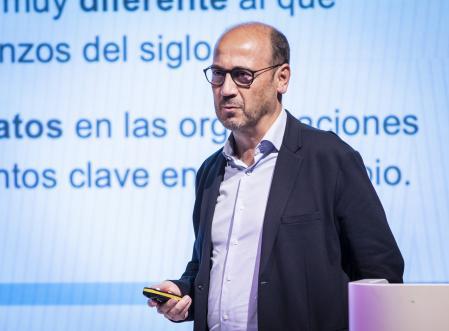
Echevárri has broken down the use of data within the banking sector
Llibert Teixidó / Propias
The expert has indicated that “the current context requires promoting strategic data management as a creator of value and competitive advantages” using the most modern technologies. But he has clarified that it is necessary to know how to discern between what is going to be useful and what is not, depending on the sector of the company.
The bank is doing it. It has always been a defensive sector, now it is trying to “be more offensive” at the data level in order to offer customers the best solution. On the other hand, the data, which can be bank-client interactions, also help to detect the vulnerabilities of each user in order to adapt to their needs.
Cycle of Meetings on Digitization and Technology
Finding the Right Framework for Data
Marta Simelio, manager of Telefónica Companies in Catalonia, has assured that the digitization of companies and SMEs is a “unique opportunity” for the economy to grow. “The data allows management,” she said.
Do Spanish SMEs have the appropriate digitization? Simelio has explained that there is still a long way to go. This is the right time to do it. The objective of Spain and Europe is to create “a society that, driven by data, can have a common digital market in which data can circulate ethically and freely”.
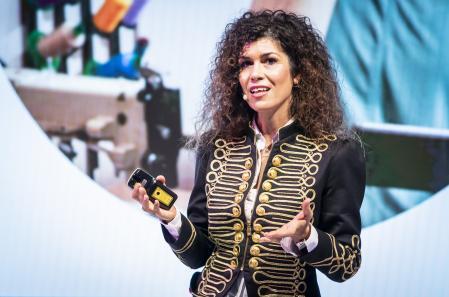
Simelio has indicated that the country’s business fabric can still improve
Llibert Teixidó / Propias
The three pillars to achieve this, according to Simelio, are:
Public-private collaboration Establish a shared framework in which all states feel comfortable Empowerment of citizens and entrepreneurs
Cycle of Meetings on Digitization and Technology
SMEs, data and transformation
It may seem that the concepts of data and artificial intelligence are closer to large multinationals with many resources and farther from SMEs. This question has been raised in the round table among the experts. “In the end, technologies need time to be implemented. What we cannot expect is for SMEs to get used to Big Data or AI. Everything has time and little by little they are incorporated”, explained Roca.
In this sense, the president of the Fundació Punt.cat has insisted that SMEs will end up incorporating these technologies and must be prepared for when their time comes. “But first, those who can, have to explore them”, he has clarified. For Echevárri it is important that each company knows when to take the step.
We cannot expect SMEs to get involved with Big Data or AI
Genís RocaPresident of the Punt.cat Foundation
Gibert has commented that digital transformation can be considered in a generalized way in a company. However, sometimes it is better to focus only on the weak points, the most manageable, instead of “turning the company upside down”. These changes, no matter how small, “will make companies more competitive and more capable of surviving,” Simelio pointed out.
The digital transformation, precisely, is that great forgotten by companies, which must understand that, as Roca has explained, “betting on incorporating technologies to improve” means “wake up, be up to date”. Gibert has completed that the data, in addition to preparing companies to be in a better position than the competition, serve to “have a look as faithful as possible on a very complex reality”.
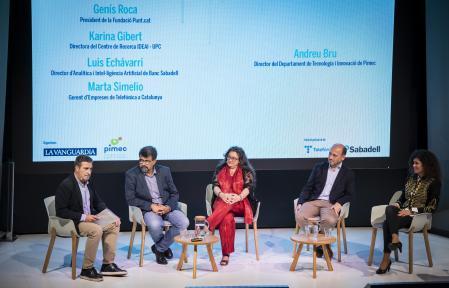
The experts discussed data, SMEs and the transition to a more digitized environment and the complications that this entails
Llibert Teixidó / Propias
For SMEs to be prepared to catch up, which may be in “two or three years”, collaboration is necessary, as Echevárri has recognized. “It happens in banking: there is a very close collaboration. When a bank detects that something unusual is happening, it alerts the others. And this has to be transferred to the industrial fabric,” the expert has detailed. Simelio, for his part, has guaranteed that the figure of the data scientist is not necessary in all companies since “data crossing” with other companies and administrations “can give more quality to the data”.
The road to digitization, however, is not a bed of roses. Many SMEs do not have the necessary resources to undertake this transition. Neither is data culture. Many small and medium businesses do not have this habit and can be overwhelmed. Simelio has recommended seeking advice to serve as an accompaniment. “It’s taking small steps to gradually incorporate technology,” she commented.
Cycle of Meetings on Digitization and Technology
Nothing is free: the price is the data
Gibert has also reflected on free products. The vast majority of apps that are downloaded to the mobile are completely free for general use. The user, then, must give his consent to some terms that nobody reads and, therefore, does not know what he signs.
“It is very important that people are aware that when they authorize a cookie, they are giving their consent to what they put there”, Gibert remarked. If the result of this signature later turns against it, there is nothing to do: “You have authorized it by saying yes to things that you have not read.”


